
|
|
|
The realities of unfair trade - The case of small scale cotton farmers in Zambia
|
|
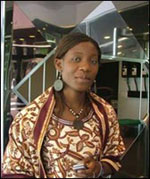
|
|
Ms. Irene Banda - Executive Director of ODCMT
|
Message from ODCMT
"What we are calling for is simple! We want the multinational companies to make profits but we do not want the small-scale cotton growers to loose out. Let the small-scale farmers get a fair deal for their sweat. A win! Win! situation will work for a farmer. What they are asking for actually is very little and we feel that if it is given to them, it will make a great difference," They are generally asking for $0.4. We strongly believe that "Fair Trade Must Start At Home"! Also tobacco farmers have expressed similar dissatisfaction at the way business is conducted. They are also crying for better prices. It is important that Farmers' labour also be quantified into monetary terms determine the profitability of their agricultural businesses. This is not happening now and it's the reason why ODCMT feels that farmers are just used as cheap labour.
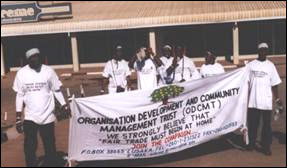
|
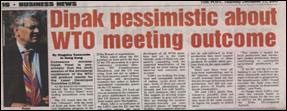
|
|
ODCMT Campaign team
|
Mr. Dipak Patel - Minister of Commerce Trade and Industry
|
Farmers expected the government to effectively represent small-scale farmers at the World Trade Organisation summit if things are to start changing.
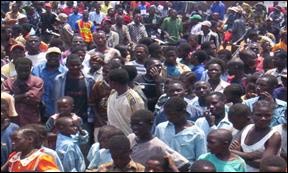
|
|
Farmers from Petauke - Eastern province of Zambia
|
"Multinational companies always exploit us because there is no one to represent us. We grow our cotton but we can not wear it!!!!!"
The minister of Commerce Trade and Industry, Mr. Dipak Patel was however pessimistic about the outcomes of the Hong Kong WTO ministerial.
He also says: "the multinationals are using the monopoly ruthlessly We are trying to talk to them but they are always threatening that they are ready to pull out if government is going to push them". The minister also alluded to the fact that Zambia was too fast in its Privatisation and Liberalisation processes and this has made it difficult for government to intervene in issues to do with prices. And when asked what he preferred between fair trade and free trade, his response was "I prefer fair trade."
Multinational companies threaten to close down because of the appreciation of the Zambian Kwacha against the US dollar.
Some multinational cotton companies in Zambia have threatened to quit their cotton business if the Kwacha continued to appreciate against the US dollar. Dunavant, the largest cotton buyers in the country says that the appreciation of the Kwacha would affect the cotton business negatively because the company would incur losses on exports and that this would also affect the prices of seed cotton. This means that Dunavant will offer even lower prices to small-scale farmers. Prices of seed cotton are expected to drastically drop from K1200 per Kg (2004/2005) to about K700 per Kg (2005/2006). This is almost half way reduction in the income of a poor farmer who will be hit the most in this game because the costs of inputs have not reduced even after the appreciation of the Kwacha. It is sad that the companies would threaten to close down when the small-scale farmers have for years sacrificed to work for almost nothing. Farmers are not even aware of the expected lower prices for the next selling season because prices are unveiled to them during the selling period. One would not want to imagine what would happen to the affected farmer. According to Richard Larkin, Chairman of Dunavant Cotton Zambia, the company would stop supporting up to 300 000 farmers. "If this exchange rate prevails into February, Dunavant would be forced to cease trading as it would be unable to secure seasonal banking facilities used to purchase seed cotton crop from the farmers- we support up to 300 000 farmers who in turn support about 1.2 million people". (IRIN)
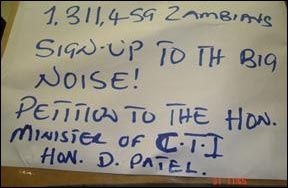
|
|
Petitions presented to the minister of Commerce Trade and industry
|
Who has joined the Campaign?
More than 1.3 million Zambians signed the petition against unfair trade and the petition was symbolically presented to the Minister of Commerce Trade Industry, Mr. Dipak Patel.
The Organisation Development and Community Management Trust (ODCMT) also participated in the 2005 Hong Kong WTO meeting and are yet to make a position on the outcomes of the meeting, as a report back to the small-scale cotton farmers who signed up the petition.

|
|
Compiled by Daka Jimmy Zindikilani - ODCMT
|
|
|






